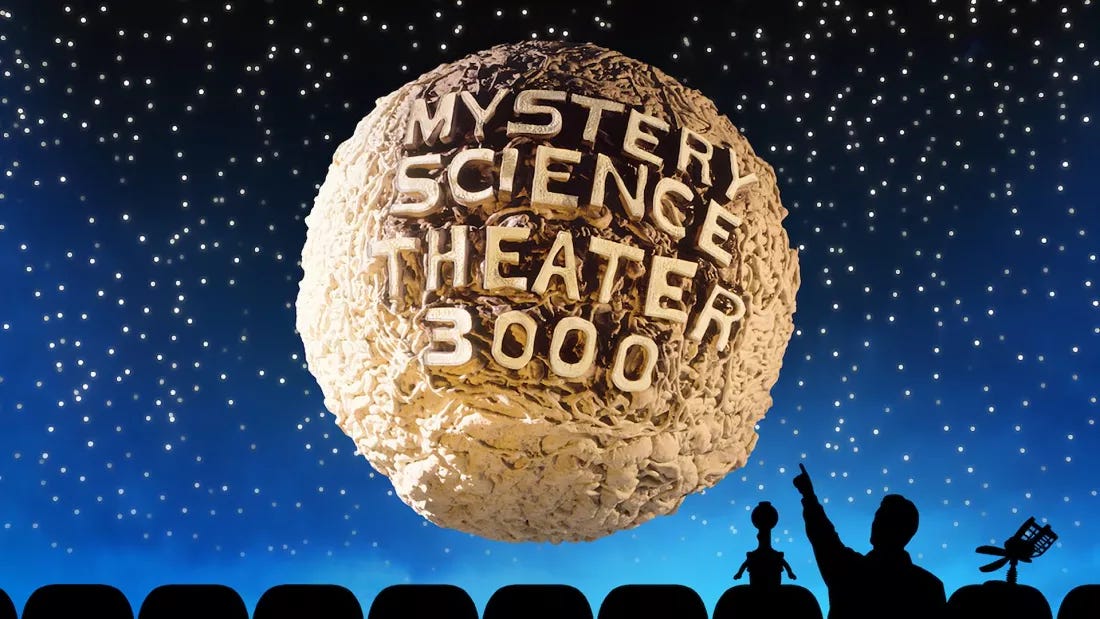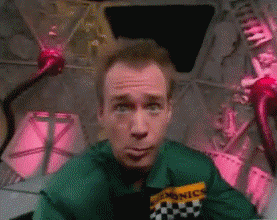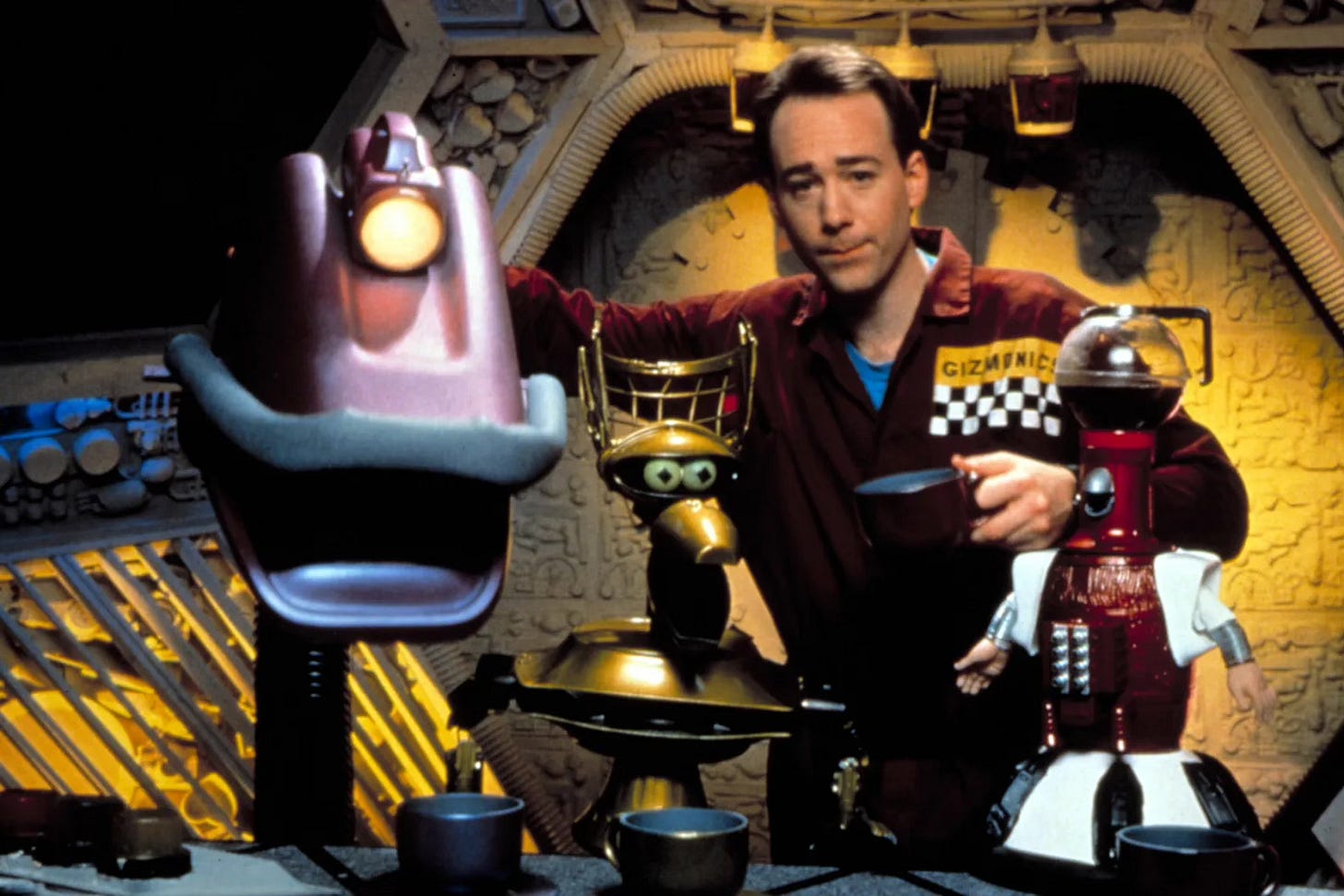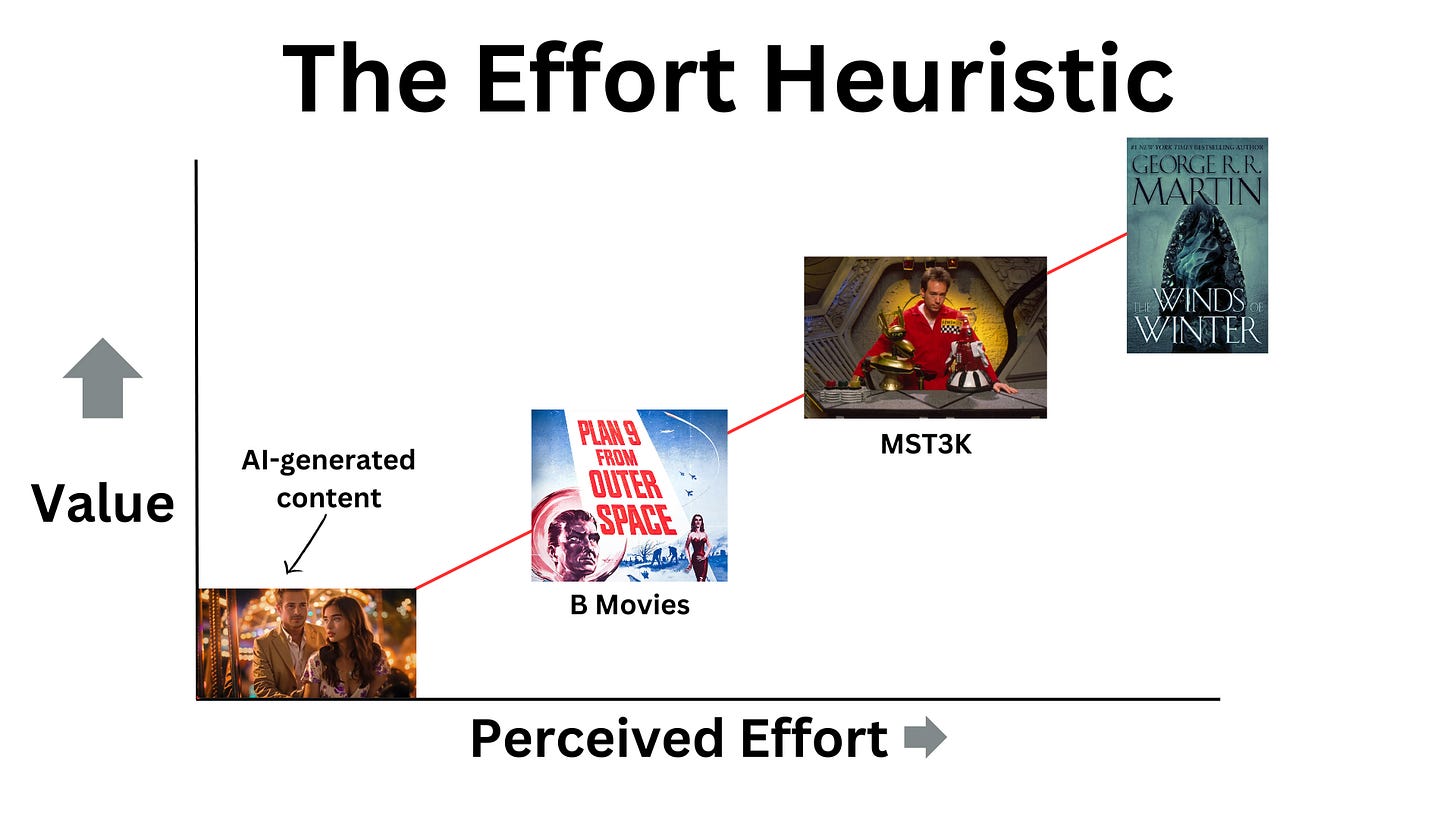What Robot Puppets and B Movies Can Tell Us About The Future of Generative AI in Media
Mystery Science Theater 3000, the Effort Heuristic, and how humans value content
The world changed forever in November 2022, when OpenAI officially released ChatGPT to the public and unleashed a technological earthquake. The AI chatbot has since dominated headlines and turned into a household name, becoming the fastest growing app in history and ushering us into the Age of Generative AI.
Despite being out for less than two years, the technology already looms large over the future of the creative industries like a destroyer. And that's just text generation, which seems to have peaked (for now) with the release of GPT 4. Although ChatGPT 5 is most likely just around the corner and new models like Claude from Anthropic are being released or upgraded every day, the latest headlines concerning LLMs aren’t about their increases in reasoning or writing ability, but are instead about multi-modality or whether or not they’re imitating celebrity voices.
Video and image generation, on the other hand, are still improving at record speed. It was only a year ago when Will Smith eating spaghetti was a viral meme/horror show, shared everywhere for laughs.

Oh how times have changed! OpenAI’s Sora blew that out of the water one year later. One. Year. Later. Let that sink in.
At the present moment, possibly no industry faces greater uncertainty in the wake of GenAI’s rise than entertainment media. The writing is on the wall - adapt or die. But are things really that bad?
In this essay, I argue that despite these rapid advancements and the anxiety gripping the entertainment industry at large, the core value of human creativity remains undiminished, largely due to a psychological phenomenon known as the Effort Heuristic. This phenomenon suggests that we, as consumers and creators, inherently value content more when we perceive that significant effort has been invested in its creation. Specifically, significant human effort.
Performance Anxiety
For creative professionals, there’s indeed a lot to be worried about. For starters, there’s the societal fear that AI will be yet another tool for the corporate gatekeepers and moneyed interests to further squeeze budgets, salaries, and timelines. And there’s the ever-present existential concern that a flood of high quality AI-generated content will completely devalue the work of human creators - everyone from writers and actors to directors, musicians, and visual artists would be on the chopping block, along with anyone else involved in the production of film, television, and digital media.
That was one of the main fears propelling the dual strikes of the WGA and SAG-AFTRA, paralyzing the industry for months.
On some level it seems inevitable that we'll all be replaced by machines, regardless of job or career. Maybe that’s just the result of too many dystopian sci-fi movies over the past few decades, but at a minimum it seems all too likely that the rich will get richer, media will continue consolidating, and art and culture will atrophy.
I’m not convinced that’s how it’s going to play out though.
Don't get me wrong. No one can predict how Generative AI will change the world in the long run. Things are going to change, that much is clear.
After all, change has been a constant in media since its inception, with technological innovation often at the center of the shifting ways we create and consume media. But regardless of how it's made, as long as there's a demand for human-created content, someone has to make it...right?
The Million-Dollar Question
But what if the demand for human-created content completely dries up? I'm talking about that moment when the machines can make art and entertainment that's completely indistinguishable from anything created by humans. When the AI constructs will escape the Uncanny Valley, ChatGPT is better than a dozen monkeys banging on typewriters, and image and video renderings don't have that tell-tale AI sameness, not-quite-right perspectives, or people with strange numbers of fingers and creepy faces.
When that happens, will humans care who - or what - made their content, so long as it's entertaining?
The Future of Content
In a media landscape flooded by sequels, spinoffs, reboots and projects powered by existing IP, it's easy to be extremely pessimistic about the future of content demand.
If the only things that can make money right now now are watered-down, derivative, or powered by something audiences are already familiar with, then how much worse could it really get? We managed to arrive at this precarious position without Generative AI’s help, after all.
This sad state of affairs has become fertile ground for the pessimism necessary to not only imagine a future where all consumer media is created by Generative AI, but to see it as practically inevitable.
That inevitable Generative AI-dominated future looks something like this:
The best “authors” are specialized chatbots that can spit out endless content in virtually no time, in any style imaginable.
Our most famous “actors” are AI constructs.
AI-generated music tops the charts.
You can make any movie you want with a few prompts. Maybe you can simply describe the plot to your AI assistant, or say "surprise me" and it will make something suited to your tastes based on what it knows about you - which is everything, of course.
From the perspective of content creators, this Generative AI future seems like a creative wasteland, not to mention the end of our livelihoods.
But what if you're the consumer of content in this dark vision of the future?
The Content Singularity
Perhaps rather than being a creative wasteland, this Generative AI future I'm describing is actually a form of media consumption bliss, a buffet of infinite possibilities. We could be nearing the end result of centuries of the democratization of the creative process, simplifying the tools of creation more and more until anyone can create whatever they want - no talent or technical expertise necessary.
If that's the future of media and entertainment, it doesn't sound like there's much room for human creators. This Content Singularity will wipe us all out, because it's impossible to compete with the infinite, instant, high-quality and cheap possibilities enabled by Generative AI.
But as depressing as our media environment has become and as perilous as the future looks, I'm not convinced Generative AI will bring about this dystopian creative nightmare.
And the reason I think that has something to do with robot puppets and B movies.
What can MST3K tell us about the future of media and Generative AI?
In case you’ve never seen it, Mystery Science Theater 3000 was a comedy show that originally premiered on KTMA-TV in 1988 before moving to Comedy Central from 1991-1996 and then Sci-Fi from 1997-1999, eventually becoming a cult classic and cultural touchstone. I loved watching MST3K on Comedy Central during my formative teenage years. I even had a Crow shirt in high school, because I was so painfully cool!
Robot Roll Call
If for some bizarre reason you didn't watch MST3K when you were an awkward, nerdy teenager like I did, or missed its recent Netflix revival, the premise of the show is that in the not-too-distant future there’s a guy whose bosses don’t like him, so they shoot him into space.
The guy - Joel - keeps himself company by building a crew of robot friends out of random parts he finds on the space station. His two main robot pals are Crow and Tom Servo.
Joel, Crow and Tom Servo are forced to watch “cheesy” movies as a form of sadistic torture by his bosses. The show was really ahead of its time with the Late-Stage Capitalism stuff!
While they can't control when the movies begin or end (la la la!), they attempt to claw back some agency by making fun of them. And that's the show - a concept as simple as it was groundbreaking.
So why is making fun of these bad movies entertaining, and how is it relevant to Generative AI and the future of media?
The answer to both questions is that MST3K’s premise taps into something fundamental about human psychology called the Effort Heuristic, which is how humans - and our robot puppet friends - evaluate and judge creative works.
Low Effort = Low Value
So what’s a heuristic, you might be asking? It’s a mental shortcut humans make to quickly solve problems. The key here is that these heuristics happen on a subconscious level. We don’t actively think about them, they’re just part of our basic psychology.
In this case, the Effort Heuristic suggests that people tend to value products, art, or outcomes more highly if they believe a great deal of effort went into their creation. A study performed in 2004 explored this using a poem, a painting, and a suit of armor, examining the difference in how participants valued them based on how much time they were told went into creating them. The more time spent creating the poem, painting or suit of armor, the higher the perceived value among the study’s participants.
Modern art provides one of the most basic and understandable cultural examples of the Effort Heuristic. Inevitably when people see a Jackson Pollock or a painting consisting of simple shapes by Piet Mondrian, they think, “I could do that!” and don’t assign as much value to those works as they do a lifelike portrait or still life. This comes down to the vast difference in the perceived amount of time, effort and skill that went into creating the different works of art.

When you start assessing how the Effort Heuristic defines your perception of the value of creations throughout your life, you can’t unsee it. It’s around us all the time.
Let's look at some Generative AI examples in day-to-day life
If your friend shows you some digital art and tells you they made it in Photoshop or Procreate, you're probably impressed, right? You'll at least look at it and take some time to provide a thoughtful response.
But what if your friend sends you something they clearly made in Midjourney or DALL-E?
You might glance at it, and it might even be cool! But it's not going to command the same level of engagement as art they created themselves, because you know that instead of spending time making it by hand, they typed in some prompts and the AI did all of the work. Not so impressive anymore.
Or say a friend sends you something they wrote: a screenplay, a poem, their new Substack post. You'll probably read it, right? After all, they took the time to write it and share it with you.
Now what if that same friend sends you something they clearly wrote with ChatGPT? Maybe at the beginning of the ChatGPT phenomenon you would take the time to read it because of the novelty value, but not anymore. You know they didn't spend time crafting every word, so why should you spend your precious time actually reading it thoroughly?
The Effort Heuristic In Media
In media creation, quality is everything, so the Effort Heuristic has a huge impact on how it’s perceived by consumers. That’s why the best directors want the perfect take or the perfect shot. Good enough doesn’t cut it, because it breaks the spell. We strive for perfection, and perfection takes time and effort.
What’s the opposite of the perfect take or the perfect shot?
Sloppy editing, bad lighting, poor acting, and clunky writing. Productions or media with these qualities might be fun to consume ironically, but we don’t assign a lot of value to them, assuming they were made quickly, cheaply, and without a lot of attention to detail. We also tend to mock them. Case in point - a movie like The Room.

The Effort Heuristic: The Show
That’s why, in my opinion, if your goal was to turn the concept of the Effort Heuristic into a TV show, you couldn’t do any better than Mystery Science Theater 3000.
The movies they make fun of - and there are some doozies - represent the low end of the Effort Heuristic. Their imperfections - the bad costumes, writing, acting, props, sets and so on - read as low effort, and as a result, we don’t assign a lot of value to them. It’s funny to listen to Joel, Tom Servo and Crow make fun of them for this exact reason.
Contrast that with the writing and craft of Mystery Science Theater 3000. It’s extremely well-written, has a quirky concept, and is brimming with creativity. Its high perceived effort increases its value in the eyes of viewers, who enjoy watching the characters make fun of the low-effort, low-value movies like Plan 9 From Outer Space and Manos: The Hands of Fate.
So now that we understand the Effort Heuristic, what can it tell us about the future of media as it relates to Generative AI?
Generative AI is the epitome of low effort/low value content
While AI-generated content improves on a daily basis, the Effort Heuristic suggests that we don’t need to take the quality of such content into consideration. Instead, the primary metric humans will use to evaluate AI-generated content will be perceived effort - just as we evaluate all other content.
And despite being a technological marvel, AI-generated content is by its very nature low effort. There’s an irony there, for sure - the creation of Generative AI itself requires tremendous time and effort, but its fundamental purpose is to make it relatively effortless to create high-quality content.
A decidedly low-quality offering provides our first test of an AI-generated movie and the Effort Heuristic. Next Stop Paris is the world’s first AI-generated romantic comedy, produced by TCL, a company that makes televisions. And if the trailer is anything to go by, it’s as bad as you would expect.
Not only is Next Stop Paris probably terrible, but consumers likely won’t assign much - if any - value to it, because of its perceived lack of effort according the Effort Heuristic.
In fact, Next Stop Paris is probably too bad and too low-effort/low-value to be featured on a show like Mystery Science Theater 3000. MST3K only works because it’s making fun of the sincere efforts of actual humans to create something, and for a variety of reasons - including an overall lack of effort, talent, money, time or whatever else - they failed. And that’s funny. Making fun of the results of a series of prompts doesn’t seem like much of a good time, so don’t expect to see Next Stop Paris on a future episode of MST3K anytime soon.
But even if we assume Generative AI will inevitably become capable of making Hollywood-quality movies and other media, nothing changes the fundamental nature of the Effort Heuristic, landing AI-generated content squarely at the bottom of the value scale.
And that’s why no matter how good Generative AI becomes, humans will still be an integral and necessary part of the creative process, because of the Effort Heuristic and how we value content.
Learning from the Effort Heuristic
So is this revelation a cheat code that prevents us from having to worry about AI taking our jobs or destroying our industry? Not exactly.
But understanding this important part of human psychology should at least allay some of the most extreme fears about the collapse of the content industry. Or maybe I should say, fears about the collapse of the demand for content. The industry is currently facing several existential problems, of which Generative AI is but one.
In upcoming posts, I’ll continue examining the intersection of Generative AI and the future of storytelling, focusing on how I believe we can harness the power of Generative AI to push the boundaries of creativity while maintaining the human element so crucial to creating high-quality content.







